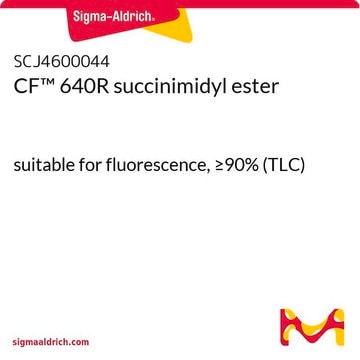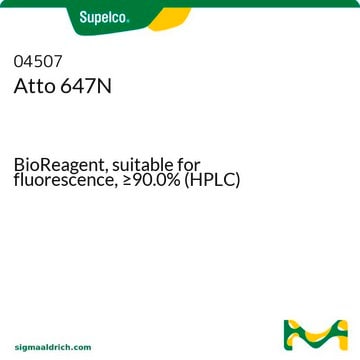06699
Atto 532
BioReagent, suitable for fluorescence, ≥90% (HPCE)
Sign Into View Organizational & Contract Pricing
All Photos(1)
About This Item
Recommended Products
product line
BioReagent
Assay
≥90% (HPCE)
manufacturer/tradename
ATTO-TEC GmbH
fluorescence
λex 533 nm; λem 560 nm in 0.1 M phosphate pH 7.0
suitability
suitable for fluorescence
storage temp.
−20°C
General description
Atto 532 is a new label with high molecular absorption (115,000) and quantum yield (0.90) as well as sufficient Stoke′s shift between excitation and emission maximum. It is optimized for excitation with frequency doubled Nd:YAG-Laser, and is characterized by high photostability.
Application
Atto fluorescent labels are designed for high sensitivity applications, including single molecule detection. Atto labels have rigid structures that do not show any cis-trans-isomerization. Thus these labels display exceptional intensity with minimal spectral shift on conjugation.
Atto 532 has been conjugated with the secondary antibodies for STED (stimulated emission depletion) microscopy and immunofluorescence studies.
Atto 532 has been conjugated with the secondary antibodies for STED (stimulated emission depletion) microscopy and immunofluorescence studies.
Legal Information
This product is for Research use only. In case of intended commercialization, please contact the IP-holder (ATTO-TEC GmbH, Germany) for licensing.
Storage Class Code
11 - Combustible Solids
WGK
WGK 3
Flash Point(F)
Not applicable
Flash Point(C)
Not applicable
Personal Protective Equipment
dust mask type N95 (US), Eyeshields, Gloves
Certificates of Analysis (COA)
Search for Certificates of Analysis (COA) by entering the products Lot/Batch Number. Lot and Batch Numbers can be found on a product’s label following the words ‘Lot’ or ‘Batch’.
Already Own This Product?
Find documentation for the products that you have recently purchased in the Document Library.
Customers Also Viewed
Uffe V Schneider et al.
BMC biotechnology, 10, 4-4 (2010-01-28)
Melting temperature of DNA structures can be determined on the LightCycler using quenching of FAM. This method is very suitable for pH independent melting point (Tm) determination performed at basic or neutral pH, as a high throughput alternative to UV
3D reconstruction of high-resolution STED microscope images.
Punge A et al.
Microscopy Research and Technique, 71, 644-644 (2008)
Toshiro Saito et al.
Nanotechnology, 22(44), 445708-445708 (2011-10-13)
We fabricated platinum bowtie nanostructure arrays producing fluorescence enhancement and evaluated their performance using two-photon photoluminescence and single-molecule fluorescence measurements. A comprehensive selection of suitable materials was explored by electromagnetic simulation and Pt was chosen as the plasmonic material for
Chunlai Chen et al.
Nucleic acids research, 35(9), 2875-2884 (2007-04-14)
Hybridization of nucleic acids with secondary structure is involved in many biological processes and technological applications. To gain more insight into its mechanism, we have investigated the kinetics of DNA hybridization/denaturation via fluorescence resonance energy transfer (FRET) on perfectly matched
Evidence for major structural changes in subunit C of the vacuolar ATPase due to nucleotide binding.
Andrea Armbrüster et al.
FEBS letters, 579(9), 1961-1967 (2005-03-29)
The ability of subunit C of eukaryotic V-ATPases to bind ADP and ATP is demonstrated by photoaffinity labeling and fluorescence correlation spectroscopy (FCS). Quantitation of the photoaffinity and the FCS data indicate that the ATP-analogues bind more weakly to subunit
Our team of scientists has experience in all areas of research including Life Science, Material Science, Chemical Synthesis, Chromatography, Analytical and many others.
Contact Technical Service








